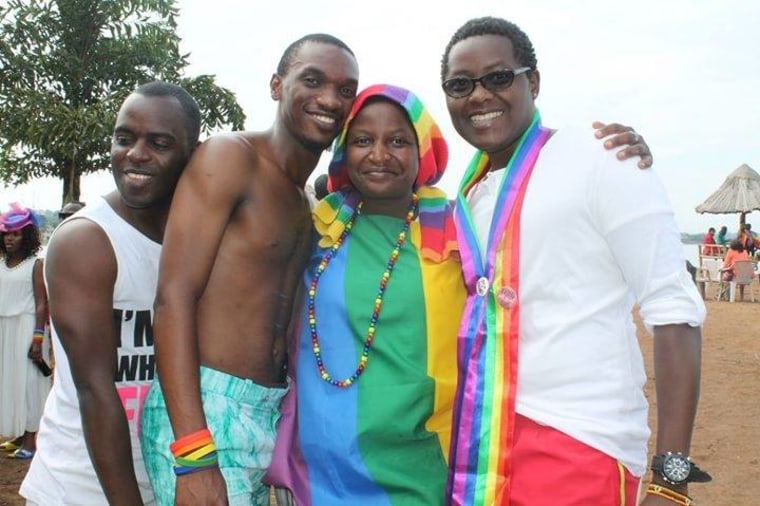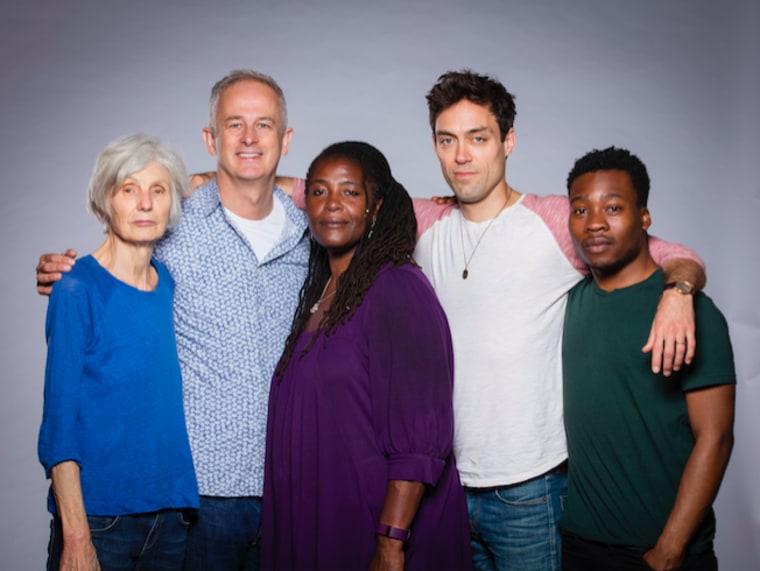Declining LGBTQ rights in Africa were put on display in London with a performance of "Pigs & Dogs," a play documenting the history of gender identity throughout the continent amid present homophobic tension and discrimination. Written in line with the 2014 passing of Uganda’s Anti-Homosexuality Act -- a now nullified law punishing homosexuals by death -- the 10-minute production used historic narrative and tribal language to expose Western influence on the anti-gay legislation that’s found in African nations today.
Exploring how British colonialists and American evangelists have changed perceptions of sexuality in countries like Uganda is relatively unknown, explained "Pigs & Dogs" director Dominic Cooke.
“Prior to colonization, LGBT people and behavior was widely accepted in many African tribal cultures,” he told NBC OUT. “It's important to share this when LGBT people are being oppressed -- and in some cases murdered -- in African countries today. It is also important for this to be heard by members of the African diaspora who have been told that homosexuality is a western invention.”
Four years of debate with significant international attention surrounded Uganda’s Anti-Homosexuality law when it was first introduced in 2009. Advocates for strengthening the legislation, that would see life imprisonment sentences for partaking in same-sex relations and possible death penalty to those engaging in homosexual acts with minors, labelled it as crucial in protecting Ugandan society and its youth.
“Prior to colonization, LGBT people and behavior was widely accepted in many African tribal cultures ... It's important to share this when LGBT people are being oppressed -- and in some cases murdered -- in African countries today."
In 2011, Ugandan MP David Bahati, who had submitted the Anti-Homosexuality Act as a Private Members Bill, told a BBC World debate that homosexuality was un-African because, “it is inconsistent with African values of procreation, a belief in continuity of families and clan.”
But "Pigs & Dogs" presents an alternative account to Uganda’s cultural origins, where prior to the arrival of Christian missionaries in the late 18th century, the country maintained a tolerant view toward varying sexual orientations.
“There are names and terms for different sexual feelings and relationships within African cultures that date back centuries,” said actress Sharon D Clarke, one of the three performers in the one-act play written by British playwright Caryl Churchill. “These are really old terms that have been in their culture for years, and now they’ve been brainwashed to think that it’s wrong and not part of their culture when it is.”
The terms that Clarke refers to are heard from start to finish in "Pigs & Dogs," showing the possible prevalence of LGBTQ persons in African tribal cultures. Words such as "sagoda," meaning, marry and wear skirts; "ashtime," dress like women and do women’s work; and "mumenke," a man-woman, are translated in the production.
“These are things that exist in Kenya, in Botswana, in Nigeria,” Ugandan LGBTQ activist Pepe Julian Onziema told NBC OUT. “And it’s true, it’s really colonialism that erased all that.”

Onziema is the Programs Director at Sexual Minorities Uganda (SMUG), a non-for-profit organization based in Kampala, which documented 264 cases of LGBTQ discrimination and abuse from May 2014 to December 2015. An advocate for LGBTQ rights since the age of 15, Onziema has had multiple interactions with clan members who have described instances of same-sex relationships in pre-colonial Uganda as, "man who sleeps with man," for example.
Prior to the Anti-Homosexuality law, same-sex relations were –- and still are -- criminalized under section 145 of Uganda’s penal code, a law leftover from British colonial rule imprisoning LGBTQ persons caught in sexual activity.
“Colonialism was about amassing power,” said Onziema, mentioning King Mwanga II of Buganda, who became Uganda’s last monarch when he relinquished to the British in 1894. “Because the King was more powerful than the colonialists they had to find a way for him to lose power. They used the fact that he was gay, saying that it was against the order of nature and God, and his subjects started rebelling.”
“Most of the violence that’s carried out here is normally triggered by Western influence ... I would ask embassies to support us more and regulate propagandists, especially religious leaders, who come to Uganda with the face of charity but actually teach communities from a young age about homophobia and a hate for their own origins.”
As same-sex marriage started to become legalized across the U.S., American evangelists with an anti-gay agenda began losing power. In 2009, Pastor Scott Lively, president of the religious charity and acclaimed hate group Abiding Truth Ministries, travelled to Uganda to take part in a series of seminars, aiming to assist the nation’s predominately Christian society in defending itself against the threats homosexuality posed to traditional family values.
“The main thing that he was telling people was that the 'gay agenda’ includes the recruitment of young children,” Onziema told NBC OUT.
The seminars coincided with the introduction of the Anti-Homosexuality Act, panic and an increase of homophobia spread throughout Uganda with many suspected LGBTQ persons expelled from their homes and schools.
In 2012, SMUG filed a lawsuit against Lively for his role in influencing the anti-gay legislation and for his violation of international law and the rights of LGBTQ persons in Uganda. The case is ongoing.
“Most of the violence that’s carried out here is normally triggered by Western influence,” said Onziema. “I would ask embassies to support us more and regulate propagandists, especially religious leaders, who come to Uganda with the face of charity but actually teach communities from a young age about homophobia and a hate for their own origins.”
Onziema said since the nullification of the Anti-Homosexuality Act in August 2014, homophobic violence has reduced. But, he added, a recently introduced tool for sexual health education in schools continues to be spun by religious leaders as a means of homosexual recruitment, furthering a climate of misinformation and fear where LGBTQ persons still face police harassment, limited access to healthcare and daily threats of violence.
RELATED: Ugandan Police Storm Gay Pride Event, Arrest More Than a Dozen People
On August 4, Onziema and other LGBTQ activists were arrested during a Uganda Pride event at Kampala’s Venom nightclub, with police claiming the event was without a permit. Upon release, Onziema told BuzzFeed News, “There’s no way we would hold an event without a clearance.”
Based on the book "Boy-Wives and Female Husbands: Studies in African Homosexualities," "Pigs & Dogs" ran at London’s Royal Court Theatre from July 20 through to July 30. The cast, which included actors Fisayo Akinade and Alex Hassel, sent their love and solidarity to LGBTQ persons in Uganda.
